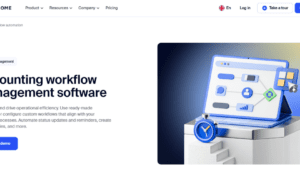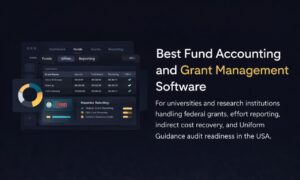Common errors in accounting are accidents and inaccuracies that occur during the accounting process. They are not synonymous with fraud, but rather unintentional mistakes that could, if left unattended, make it difficult to detect deliberate attempts of fraud. The accounting department wants to minimize as many common errors in accounting as possible. Being aware of the most common accounting errors will help you and your accounting team manage and prevent these errors from happening in your accounting process.
9 common types of accounting errors in businesses
While there are many different errors that could happen in the accounting process and they vary from business to business, some errors are more likely to happen than others. Here is a list of some of the most common accounting errors.
- Compensating error
Accounting errors can be difficult to detect due to offsetting errors by making another error to counter them. For example, compensation errors happen when there is an error in inventory entry. It’s possible that the corresponding accounts payable entry for the inventory entry is wrong as well, completely offsetting and masking the error. - Duplication error
As the name suggests, a duplication error happens when there is a repeat of the same entry. A purchase could be recorded as being debited twice, which does not match up with the actual amount debited. - Error in the original entry
One of the most common accounting errors that could lead to many other errors is an error in the original entry. Entering the wrong amount in a particular transaction record can carry over to other accounts and entries related to the transaction. - Mistakes in handling data
A source of common accounting errors can be data entry errors. When manually entering data, you could end up with typos like misplaced decimals, which will skew your accounting records. - Error of principle
An error of principle occurs when the wrong accounting treatments are used for transactions. Errors of principle are significant technical errors that do not follow the Generally Accepted Accounting Principles (GAAP) correctly. - Error of omission
Some common errors in accounting are made because no transaction is recorded to begin with. Errors of omission are overlooked transactions that are left out of the accounting records altogether, which can be very difficult to detect. - Error of commission
Errors of commission happen when incorrect action is applied, such as entering the wrong general ledger number for a transaction, having the wrong rounded value noted down, or even accidentally switching debit and credit when entering transactions. - Transposition error
Transposition errors happen when numbers are reversed or switched around in the data entry process. A transaction that is meant to say $735 could be recorded as $375. A deductible amount that isn’t claimed can become a costly error. - Misusing the accounting software
Data on accounting software can be outdated, especially if not tended to well. If your accounting software of choice has a complex user interface and isn’t easy to use, this could also produce errors when using the software.
What are the effects of accounting errors on your business?
Most common accounting errors add up, which will impact your business negatively. Some examples of how common accounting errors can affect your business include:
- Inaccurate income reporting
Errors could lead to a distortion of your profit margins. You could come away with inflated income reporting and overstate how much money your business is making. - Cash flow information
When many common errors in accounting are made, cash flow information can get skewed. Your records could either over or understate the amount of cash you actually have on hand, which may cause you to make decisions based on this misinformation. - Inaccurate expense reporting
Mistakes in recording deductible expenses will lead to inaccurate expense reporting. This could result in you overpaying or underpaying your taxes, with the former leading to a bleed in cash flow and the latter potentially causing you compliance issues. - Increased labor costs
Errors are costly and time-consuming. Your employees could end up working overtime to fix these errors. Not only will this lower morale, but it will cost you more hours or result in you having to hire more staff. - Late payment fees
Invoices that are missed in the accounting process and only discovered to be not recorded past their due date will incur late payment fees. These late payment fees are unnecessary costs that could otherwise be avoided. - Improper matching of income and expenses
If your business does accrual accounting, there might be a miss between the income generated and expenses made by your business. Common accounting errors could cause an imbalance between the two. - Difficulty to detect fraud
While errors are not the same as fraud, having your books riddled with the most common accounting errors will make it harder to detect any form of deliberate fraud. It’s difficult to see which are honest mistakes and which are malicious attempts.
How should you prevent accounting errors from happening?
- Utilize automated cloud accounting software
Use Integrated accounting software to minimize manual touchpoints and create fewer errors. Automated accounting software also can detect errors and help you apply company-wide standards and policies to all your books. If your software of choice is cloud-based, it will also update automatically and you won’t end up with outdated software. - Segregate certain duties and review the work
Most common accounting errors happen because there are too many manual touchpoints and not enough review processes. Segregate your accounting staff’s duties so there aren’t too many hands involved in one task and set up a system that provides every task with a second pair of eyes for review. - Invest in already experienced accounting professionals
Have someone knowledgeable in accounting as part of your accounting team. Instead of overstretching your accounting department, what you need to fix the most common accounting errors is providing training to key people and ensuring that they’re familiar with your systems. - Implement internal controls
Implementing company-wide rules, procedures, and preventive and detective controls can promote accountability, ensure that you are in compliance with regulations, and strengthen efficiency. Make sure that you have policies on authorization, documentation, and reconciliation. - Perform timely account reconciliations
Compare your records with bank statements to make sure that they are in line with each other. You may also need to compare subsidiary journals to the general ledger, though this step can be eliminated with the help of automated accounting software. Perform monthly bank reconciliations to be on top of errors. - Adopt best accounting practices and industry standards
Properly organize your records and set deadlines for data entry and reconciliation. Make sure that your accounting software is updated, reflects industry standards, and is in compliance with regulations. Most common accounting errors can be eliminated if you are on top of your practices.
FAQ’s
- How do you identify accounting errors in time?
Having both preventive and detective controls can help you identify errors in time. Invest in accounting software that can help you implement these controls to nip errors in the bud. - Which costs will a business have to bear from accounting errors?
Common accounting errors can be costly internally and externally. When you keep making common errors in accounting, you are likely to have to increase your labor costs to fix these errors. Accounting errors can also lead to slower invoice processing or missed invoices, which will incur late payment fees when you pay them. - What are the various other types of errors in accounting?
Most common accounting errors don’t directly impact the trial balance and are harder to detect. Some of these errors include data entry errors, which is what happens when you make a typo in your accounting records, and errors of omission, which is when you forget to record a transaction whether it be with your vendors or customers. Errors of commission are another common accounting error, which happens when you enter the wrong general ledger number during your bookkeeping process. Another one of the most common accounting errors is errors of principle, such as when you record a purchase as an expense when it’s meant to be an asset. - Does accounting automation help in identifying accounting errors?
Yes. Not only does accounting automation software reduce errors by minimizing manual touchpoints, but it can also detect errors by automatically flagging entries that don’t seem right.



































